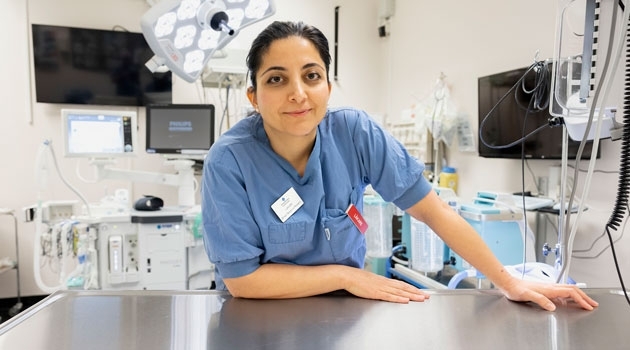Neurosurgeon elected to the Young Academy of Sweden
Elham Rostami, Docent in Neurosurgery at Uppsala University, is one of six new prominent researchers elected to the Young Academy of Sweden. As a new member, she wants to improve conditions for clinical researchers and increase interest in research and science.
The Young Academy of Sweden is a platform for young researchers who want to join forces to contribute to a better research system and society. With broad representation from different fields of research and higher education institutions, research policy proposals, international collaborations and outreach work are developed in order to reach children and young people through research.
On 21 May Rostami was elected to the Academy together with five other researchers from different subject areas and higher education institutions.
Why did you apply to the Young Academy of Sweden?
“To improve conditions for clinical researchers and to increase interest in research and science”, explains Rostami.
Research into brain injury
Her research aims to understand the underlying pathology in different types of acute brain damage, with a primary focus on traumatic brain injuries.
“We use multimodal monitoring of the injured brain, including microdialysis – or measuring of the chemical environment locally in the brain – when treating patients with acute brain injuries”, she explains.
The data generated from this monitoring is analysed alongside clinical data with help from machine learning, to identify important clues about the results. The preclinical research involves experimental brain injury models, in-vitro studies with drug testing, and patient-specific iPSC (induced pluripotent stem cells) and genetic analysis.
“Our main goal is to identify important prognostic markers and understand why some people recover better than others and what role our genetic background plays.”
Since the COVID-19 outbreak, she has also been involved in launching COVID-19 Neuro study, in which researchers are investigating associated neurological complications and SARS-CoV-2’s potential damage to the nervous system.
More members from Uppsala University
There are more members from Uppsala University in the Young Academy of Sweden: Linda Andersson Burnett (History of Science), Tove Fall (Epidemiology), Hanne Fjelde (Peace and Conflict Research), Gabriele Messori (Climate Research), Sigrid Schottenius Cullhed (Literature) and Ylva Söderfeldt (History of Science and Ideas).
“We are both honoured and pleased to be able to welcome new members. Young academics collaborate across the globe and efforts to stand up for freedom and knowledge are more important than ever”, notes Mia Liinason, Professor of Gender Studies at Lund University, who took over as the new chair on 21 May.
For example, this autumn the Academy will work on projects including the Evigt liv (Eternal Life) exhibition, a collaboration between the Nobel Prize Museum and Liljevalch’s art gallery, the Academy’s research policy for the coming four-year period and the launch of the Beginner’s Guide to Swedish Academia. In 2023 they will arrange an international meeting for young academics in Europe.
Annica Hulth

